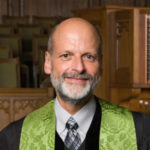
Dear friends,
For most of us alive today, the yearning for a new year has never been more pronounced. Everyone looked forward to the end of a very difficult year with the hope that 2021 will be much better. Of course, it is just the changing of the calendar from one year to another, but that change is a powerful symbol for a new beginning.
This month always raises the question of the role of past, present and future in our lives. We have common sayings that seek to guide us in this issue. For example, about the past we say, “Let Bygones be bygones.” Or, “The past has passed.” Or, “That’s water under the bridge.”
About the present, we say, “Live life in the present.” Or, “Today is the first day of the rest of your life.” Or, “Live today as if it were the last day of your life.”
Considering the future, we might say, “Don’t count your chickens before they hatch.” Or, “We’ll cross that bridge when we get to it.” Or, “We don’t know what the future holds.” There is a lot of wisdom in all that, but that conventional wisdom tends to treat the past as of no concern in the future and the future as unknown, and therefore not worth a lot of time and energy. It is all about the present.
There was an ancient teacher of wisdom who was called in Hebrew Qohelet. The name in Greek is translated “Ecclesiastes.” Our reading from the third chapter catalogs various seasons of life — twenty-eight of them arranged in sharp contrast to one another and yet each an undeniable part of human existence. For Ecclesiastes, the universe unfolds according to its own inner logic and set of seasons. Only God knows why existence is set up the way it is. He says that God “has made everything suitable for its time” and that God “has put a sense of past and future into [our] minds, yet [we] cannot find out what God has done from the beginning to the end.”
In other words, the writer is saying that God has given us a sense of past and future and we live between the two. We alone, of all God’s creatures, have this sense of past and future, even though we are unable completely to plumb the depths of the mysteries of creation at the beginning and the mystery of how it may all end.
We live in the between time. That is where life is lived. The writer speaks of the gift of enjoying life. Someone has said that today is a gift and that is why we call it “THE PRESENT.” This moment is a present given to us by God. Around the turn of a new year, we are most aware of this sense of living in the between time, this sense of past and future.
The first month of the year is named January after Janus, the ancient god of Roman mythology with two faces looking in opposite directions. Janus, according to Roman mythology could simultaneously look ahead and look back. Ecclesiastes says that we have that same ability. He says that God has put a sense of past and future in our minds. We, living in the between time, can look at the past and at the future at the same time. This is so valuable because we always have some spiritual work to do between past and future. What is the nature of that work?
Our work on the past has two aspects: You could call these Keeping and Throwing Away or Taking and Leaving or Remembering and Forgetting.
Our work on the future also has two aspects: You could call these Hope and Commitment.
Joan Chittister wrote these words that speak powerfully about Ecclesiastes and our task in the Between Time:
Ecclesiastes…teaches there is a time to kill whatever it is within us that keeps our souls from flying free. There is a time, he says, to refrain from embracing whatever it is that is smothering the heart. There is a time to weep the tears that dignify the going of those things and people in life who have brought us to where we are today. There is a time to embrace the good of life with great thumping hugs that give energy for the rest of the journey. There is a time to reap, to work hard, to achieve and assure the fruits of life. There is a time to glory in the gains of life, to run through life head up and lusty, gathering as we go, piling up the good things and laughing as we do. There is a time to love, to find ourselves in someone else so that we can find ourselves at all. There is a time to lose, a time to let go of whatever has become our captor in life. There is a time to be born, fresh and full again out of old ideas, old forms, old shapes. There is a time to laugh, to let go of the propriety and old pomposities and join the bungling, lunging, silly human race. There is a time to die, to put an end to things, to stop the carousel, to surrender to the forces of time and trust them. There is a time of war, of struggling against the forces within me that make for my destruction. There is a time to heal ourselves from the hurts that weigh us down and keep us from taking charge of our own emotional lives. There is a time to build up, to construct the new world, to co-create the globe so that what we leave behind is better than what we have received. Finally, there is a time for peace, for coming to grips with the demons within us, for staring them down and smoothing them out, so that we can spread peace like velvet.
And who shall do these things? The philosophers say the system will. The psychologists say the psyche will. Ecclesiastes, drawing both on reason and on faith, says, no, it is only we ourselves who can complete the dance of life only by dancing it ourselves, with all our hearts, with all our souls. By its very definition, Ecclesiastes implies, life simply demands it of us.
I look forward to worship on Sunday, livestreamed from the sanctuary at 11:00, as we think together about life in the Between Time.
Grace and peace,
![]()
Dr. Tim Bruster
Senior Pastor
Ecclesiastes 3:1-13
1 For everything there is a season, and a time for every matter under heaven:
2 a time to be born, and a time to die;
a time to plant, and a time to pluck up what is planted;
3 a time to kill, and a time to heal;
a time to break down, and a time to build up;
4 a time to weep, and a time to laugh;
a time to mourn, and a time to dance;
5 a time to throw away stones, and a time to gather stones together;
a time to embrace, and a time to refrain from embracing;
6 a time to seek, and a time to lose;
a time to keep, and a time to throw away;
7 a time to tear, and a time to sew;
a time to keep silence, and a time to speak;
8 a time to love, and a time to hate;
a time for war, and a time for peace.
9 What gain have the workers from their toil?
10 I have seen the business that God has given to everyone to be busy with. 11 He has made everything suitable for its time; moreover he has put a sense of past and future into their minds, yet they cannot find out what God has done from the beginning to the end. 12 I know that there is nothing better for them than to be happy and enjoy themselves as long as they live; 13 moreover, it is God’s gift that all should eat and drink and take pleasure in all their toil.
